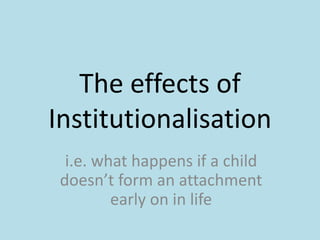Denunciar
Compartir
Descargar para leer sin conexión

Recomendados
Más contenido relacionado
Destacado
Destacado (15)
Similar a Effects of institutionalisation
Similar a Effects of institutionalisation (20)
Attachment Theory Of The Children With Autism And Down Syndrome

Attachment Theory Of The Children With Autism And Down Syndrome
Understanding Attachment in infants and toddlers ECCE 115 Plourde

Understanding Attachment in infants and toddlers ECCE 115 Plourde
The effects of separation, deprivation and privation

The effects of separation, deprivation and privation
Bass LinAshley WellsWR121-25 February 7, 2018Personalities.docx

Bass LinAshley WellsWR121-25 February 7, 2018Personalities.docx
Safeguarding Children: Getting it right from the start. Jane Barlow. 

Safeguarding Children: Getting it right from the start. Jane Barlow.
Más de sssfcpsychology
Más de sssfcpsychology (20)
Effects of institutionalisation
- 1. The effects of Institutionalisation i.e. what happens if a child doesn’t form an attachment early on in life
- 2. Definition - Institutionalisation This refers to the behaviour patterns of children who have been raised in institutions such as children’s homes. In institutions, children may have relationships with staff however; they may not have one-to-one attachments.
- 3. The effects of institutionalisation 1. Make Poor Parents 2. Deprivation Dwarfism 3. Attachment Disorder
- 4. The effects of institutionalisation 1. Make poor parents Institutionalised children may become poor parents later in life. Quinton et al (1984) - Women raised in institutions had extreme difficulties when acting as parents Why might this be? Lack of a role model?
- 5. The effects of institutionalisation 1. Make poor parents • +VE: Harlow (1960) The monkeys raised in isolation (without a real mother) went on to become poor mothers, many rejected their own offspring How/why does this support the theory? What is the problem with Harlow’s research?
- 6. The effects of institutionalisation 2. Deprivation Dwarfism Children who have a lack of emotional care may be physically underdeveloped, as well as having emotional problems. The production of hormones are affected by severe emotional disturbances which may result in this dwarfism
- 7. The effects of institutionalisation 2. Deprivation Dwarfism • +VE: Genie Deprived of emotional care from an early age when Genie was found she was severely physically underdeveloped and found it difficult to form attachments How/why does this support the theory? What is the problem with using this research of Genie?
- 8. The effects of institutionalisation 2. Deprivation Dwarfism • -VE: Czech Twins Deprived of emotional care the boys were adopted and grew to be of above average intelligence and developed well socially and emotionally How/why does this criticise the theory? What is the problem with using this research of the Czech Twins?
- 9. The effects of institutionalisation 3. Attachment Disorder A psychiatric disorder that affects a child’s social and emotional development. There are 3 factors related with Attachment Disorder: • i) Children have experienced severe neglect or frequent changes of caregiver. • ii) They have no preferred attachment figure. • iii) They have an inability to interact and relate to others (this is evident before the age of 5) Reactive (inhibited) – Shy and withdrawn Disinhibited – over-friendly and attention seeking
- 10. The effects of institutionalisation 3. Attachment Disorder • +VE: Hodges & Tizard Found that the children from their research by the age of 16 did not have a special friends, were not likely to be part of a social group and were more likely to become bullies How/why does this support the theory? What is the problem with using Hodges & Tizard’s research?
- 11. The effects of institutionalisation Outline and evaluate research into the effects of institutionalisation on child development (12 marks)